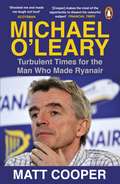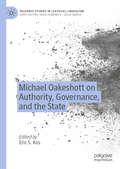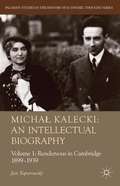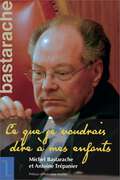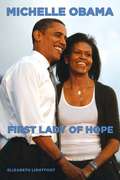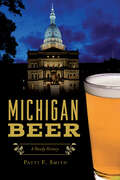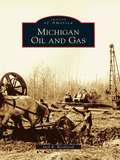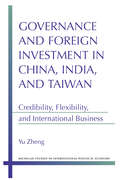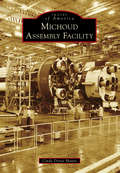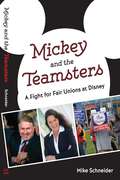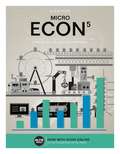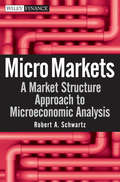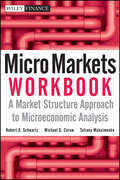- Table View
- List View
Michael O'Leary: Turbulent Times for the Man Who Made Ryanair
by Matt CooperFinancial Times Business Book of the MonthSeptember 2017. Ryanair cancels over 700,000 bookings and its powerful PR juggernaut comes shuddering to a halt. For once, the airline's aggressive and flamboyant CEO, Michael O'Leary, is contrite and apologetic.A month later Ryanair announces increased passenger traffic for October, year-on-year growth and increased profits. Its share price soars. For the moment, it appears, a fundamental shake-up of Europe's biggest airline is off the table. But questions remain about the causes of the debacle and O'Leary's role in it.Michael O'Leary lifts the veil on the wildly successful and wildly controversial Ryanair CEO. Based on extensive research - including with close associates of O'Leary - the book examines O'Leary's personality, beliefs and obsessions and describes how these have moulded the business he runs. Written by a multi-award-winning journalist and broadcaster, with a thirty-year career covering business and current affairs, it is a fascinating insight into the business behind the man, and the man behind the business.'Fascinating book ... very comprehensive' Eamon Dunphy, The Stand'An indispensable guide for anyone who wants to understand not just where Michael O'Leary and Ryanair are coming from, but where they are going.' Sunday Business Post'A frequently enlightening unauthorised biography ... entertaining' Irish Independent'In a world of colourless corporate leaders, Ryanair's aggressive, mouthy chief executive provides catnip for journalists. Cooper, an award-winning Irish writer and reporter, makes the most of the opportunity to dissect his colourful subject' Book of the Month, The Financial Times
Michael Oakeshott on Authority, Governance, and the State (Palgrave Studies in Classical Liberalism)
by Eric S. KosMichael Oakeshott on Authority, Governance, and the State presents contributions on one of the most important British philosophers of the 20th century. These essays address unique and under-analyzed areas in the literature on Oakeshott: authority, governance, and the state. They draw on some of the earliest and least-explored works of Oakeshott, including his lectures at Cambridge and the London School of Economics and difficult-to-access essays and manuscripts. The essays are authored by a diverse set of emerging and established scholars from Europe, North America, and India. This authorial diversity is not only a testimony to the growing international interest in Oakeshott, but also to a plurality of perspectives and important new insights into the thought of Michael Oakeshott.
Michael Ovitz and The Walt Disney Co. (A)
by Jay W. Lorsch Alexis ChernakFaced with the need to hire a new president, The Walt Disney Co. pursued Michael Ovitz, a founder of the Creative Artist Agency. Although initially disinterested, Ovitz engaged in negotiations with Michael Eisner, CEO of The Walt Disney Co., in the summer of 1995 before accepting an offer. Ovitz officially began as president on October 1 of that year. While the hiring of Ovitz was at first heralded as a coup for Disney, Eisner and senior executives began to have doubts about Ovitz's fit with the company culture. By the summer of 1996, Eisner decided Ovitz had to be fired. He began conversations with members of the board of directors, who agreed Ovitz's contract should be terminated. Ovitz left the company at the end of the year with a sizable severance package.
Michael Rubin and Fanatics (A)
by Robert F. Higgins John MaskoIn 2016, Michael Rubin's Fanatics was the U.S.' largest sports e-commerce company, and operator of the official online store for all the major American sports leagues. That year, Fanatics began to dabble in manufacturing licensed sports merchandise, securing limited permissions from leagues to manufacture apparel in response to 'micro-moments,' sudden surges of interest in a team or player that were too abrupt for the league's usual licensees to react to. The success of these efforts raised the possibility that Fanatics might make a play to displace a major athletic wear manufacturer as the official merchandise licensee of a major sports league. For a company with little manufacturing infrastructure and experience however, it was unclear whether this was an advisable step for Fanatics, or how they would go about it.
Michael Solomonov: Jerusalem in a Bowl
by Boris Groysberg Katherine Connolly Baden Evan M S HechtBefore the COVID-19 pandemic hit, Michael Solomonov and Steven Cook had begun to wonder whether it might be time to rethink their opportunistic approach to the expansion of their small restaurant empire in Philadelphia, CooknSolo. The pandemic, however, caused an abrupt and intense change of focus-the goal was no longer expansion, but survival. Solomonov had overcome much in his life, including addiction and the death of his younger brother; these experiences had given him the perspective to take on great challenges in his career, the COVID-19 pandemic being the greatest challenge yet. As the economy cautiously started to reopen in June 2020, how should Solomonov and Cook proceed? How should they think about their business in terms of survival through the duration of the pandemic and set themselves up to come back even stronger in the post-pandemic world?
Michał Kalecki, An Intellectual Biography: Volume 1, Rendezvous in Cambridge 1899–1939 (Palgrave Studies in the History of Economic Thought)
by Jan ToporowskiThis volume of intellectual biography takes the Polish economist Micha Kalecki (1899-1970) from the shattering of his prosperous childhood, in Tsarist Łódź in the 1905 Revolution, to Cambridge and the failure of his co-operative research with John Maynard Keynes's supporters in Cambridge.
Michał Kalecki: Rendezvous In Cambridge, 1899-1939 (Palgrave Studies In The History Of Economic Thought)
by Jan ToporowskiThis volume of intellectual biography records the work of Michał Kalecki’s maturity: his work on monetary economics and the theory of profits; his work on the problems of socialism and developing countries; and the extension of his theory of capitalism to define his work in relation to Keynes and previous political economic principles. Kalecki had, by 1939, laid out the essential elements of his theory of the business cycle in capitalism. This book begins at Oxford where, at the Institute of Statistics, he worked on the economic planning and financing of World War Two, as well as extending and detailing the particulars of his theory and examining the conditions for full employment in the post-War international monetary and financial system. Kalecki would then work for the United Nations on full employment, inflation, and developing countries. He departed from the United Nations in 1955, and returned to Poland to extend two new directions of his ideas – on the economics of developing countries and his theory of growth in the socialist economy, alongside further work on business cycles.This book is essential reading for all those who want to understand Kalecki’s lasting contribution to economic theory and policy.
Michel Bastarache: Ce que je voudrais dire à mes enfants (Biographies et mémoires)
by Antoine Trépanier Me Michel BastaracheDans une lettre qu’il adresse à ses deux enfants, morts d’une maladie incurable, Michel Bastarache se rappelle son enfance en Acadie puis sa carrière, jusqu’à devenir le premier juge acadien à siéger à la Cour suprême du Canada. Me Bastarache raconte sa constante lutte pour l’égalité des communautés francophone et anglophone. Il revient sur son engagement au sein des groupes de défense des francophones hors Québec, puis sur sa carrière de professeur, de fonctionnaire, d’avocat et de juge. Dans ce récit, il amène le lecteur dans les coulisses de ses plus importantes causes et révèle certains secrets du plus haut tribunal canadien. Me Bastarache réagit également à la polémique entourant la Commission d’enquête sur le processus de nomination des juges du Québec et sur son travail à titre de médiateur dans le processus de réconciliation et de compensation pour les victimes alléguées d’agressions sexuelles par d’anciens prêtres au Nouveau-Brunswick. Publié en français
Michelin's Green Gold Bahia Program: Leaving With Grace
by Sandra J. Sucher Susan Winterberg Shalene GuptaIn 2015, the top management of French tire-maker Michelin, was evaluating Michelin's approach to divesting its rubber plantations ten years after incorporating a novel strategy. In 2004, Michelin had a Brazilian rubber challenge. Its Bah a plantation had been hit with the South American Leaf Blight fungus, the same fungus that destroyed Henry Ford's dreams of industrializing rubber production, and the plantation's productivity had dropped. Bah a had to go. That much was clear. But how to do it? From the Michelin headquarters in Clermont-Ferrand, the rubber plantations of Bah a Brazil seemed half a world away. Still, Michelin, then led by douard Michelin, great-grandson of Michelin's founder, was founded with a deep belief in the importance of treating its employees and the environment fairly. Michelin embarked on an ambitious plan to divest the plantation while practicing corporate social accountability. However, in doing so, it had to understand the needs of its plantation workers, its environmental impact, while also considering its own needs as a business. Now, Michelin had to evaluate how well the company had done with its Bah a program, if there was anything that could be improved in its divestment process, and whether or not the plan, or elements of it, was something Michelin should consider using again in the future.
Michelle Levene (A)
by Tiziana Casciaro Victoria W. WinstonMichelle Levene discovers that she is pregnant a few days before receiving an offer for her dream job. The new position would require Levene to travel extensively, something she would not be able to do towards the end of the pregnancy and while caring for a newborn. Levene has been with biotech leader Genzyme Corp. for two years and cannot imagine a better professional opportunity than the new position at this stage in her career. Should she accept the job, telling her new manager that she is pregnant? Should she accept the job but wait a few months to discuss the pregnancy--after all, this is her first baby and who knows what might happen? Or should she meet with the new manager and tell him that under the circumstances, she would expect him to rescind the verbal offer?
Michelle Obama: First Lady of Hope
by Elizabeth LightfootFrom Lady Bird Johnson's highway beautification initiative to Jacqueline Kennedy's White House renovation to Barbara Bush's literacy project - and let's not forget Nancy Reagan's "Just Say No" program - first ladies have captivated and enthralled the voting public for 200 years. Michelle Obama has played an influential role in her husband's campaign, and is certain to do the same during his presidency. Michelle Obama: First Lady of Hope examines, for the first time, her astonishing career - from her undergraduate years at Princeton, where she majored in African Studies, to her studies at Harvard Law School, where she obtained a Juris Doctor degree. This fascinating book will further address her influence on her husband, her role in his presidential campaign, and her political beliefs. Michelle Obama is sure to be one of the most intriguing and influential First Ladies in history. She first met Barack Obama when she was asked to serve as his mentor at a prestigious Chicago law firm. She and Barack were the only African-Americans. The couple married in 1992. She is her husband's closest advisor. A Chicago native, she has attracted much media attention for her candor and frankness. This trait will serve her well in the White House, where no move or statement goes unnoticed.
Michigan Beer: A Heady History (American Palate)
by Patti F. SmithMichigan's beer history is as diverse as the breweries themselves, and the stories behind them are as fascinating as their tasty concoctions.A few enterprising women found themselves at the forefront of early brewing in the state, and several early Detroit brewers also served as mayor. Pfeiffer's mascot was designed by Walt Disney Studios. Jackson's Eberle Brewing Company took its fight against local prohibition all the way to the Supreme Court, and the Silver Foam trademark embroiled disputants in a different legal fight. Renowned modern craft brewers grew from humble beginnings, often staving off financial disaster, to establish themselves as local, or even national, juggernauts.Grab your favorite brew and join author Patti F. Smith for a look at Michigan's distant brewing past and its recent triumphs.
Michigan Criminal Law and Procedure: A Manual for Michigan Police Officers (2nd Edition)
by Michigan Department of State PoliceSeveral legal instructors throughout the state of Michigan contributed to the development of this and previous editions of this book in hopes that it will help police officers and police recruits comprehend the legal parameters that they operate within on a day-to-day basis.
Michigan Manufacturing Corp.: The Pontiac Plant--1988
by Clayton M. ChristensenMichigan Manufacturing is a broad-line maker of components for the automotive industry. It has developed a network of nine plants as its product line has grown. Newer, higher-volume products tend to be made in newer, focused, high-volume plants, while older product lines tend to be assigned to the Pontiac plant, the oldest one in the system. Because Pontiac produces such a wide variety of products, its overhead costs are very high. Management needs to decide whether to close the Pontiac plant or find a way to make it profitable.
Michigan Oil and Gas
by Jack R. WestbrookMichigan is commonly recognized as a manufacturing center and for its splendid tourist attractions. Lesser known is Michigan's role as a leader in the production of oil and gas. Since the discovery of commercial quantities of oil in Saginaw in 1925, Michigan has grown to become the 12th-largest natural gas and 17th-largest crude oil producer of the 34 states producing oil and gas. Michigan's petroleum heritage spans 64 of the state's 68 Lower Peninsula counties and has played a role in shielding communities from the financial devastation of the Great Depression, funding acquisition of hundreds of public recreation projects through the Michigan Natural Resources Trust Fund, and rising to meet environmental challenges through improving technologies. Michigan Oil and Gas documents that heritage with photographs from the Clarke Historical Library Norman X. Lyon and Michigan Oil & Gas News Collections.
Michigan Studies In International Political Economy: Credibility, Flexibility, And International Business
by Yu ZhengYu Zheng challenges the idea that democracy is the prerequisite for developing countries to attract foreign direct investment (FDI) and promote economic growth. He examines the relationship between political institutions and FDI through the use of cross-national analysis and case studies of three rapidly growing Asian economies with a focus on the role of microinstitutional "special economic zones" (SEZ). China's authoritarian system allows for bold, radical economic reform, but China has attracted FDI
Michigan's C. Harold Wills: The Genius Behind the Model T and the Wills Sainte Claire Automobile
by Alan Naldrett Lynn Lyon Naldrett Terry ErnestOne of the unsung heroes of the auto world, C. Harold Wills designed the Model T when he worked as Henry Ford's right-hand man. Later, he founded his own company to produce the legendary Wills Sainte Claire. Every endeavor displayed his trademark inventiveness, from the development of the overhead cam engine to the toboggan run on the roof of his house. He used his money to create one of the first worker model cities at Marysville, Michigan. In this long-overdue biography, Alan and Lynn Lyon Naldrett preserve the legacy of an automotive icon.
Michoud Assembly Facility
by Cindy Donze MantoAfter an auspicious beginning as a royal land grant from French king Louis XV to a wealthy French citizen of New Orleans in 1763, the land Michoud Assembly Facility occupies remained in private ownership until 1940, when it was sold to the US government. Prior to World War II, the site was used to grow sugar, hunt muskrat, and build railroad and telephone lines. In 1941, the world's largest industrial site was built, covering 43 acres of unobstructed, low-humidity, air-cooled space under one roof to construct C-46 cargo planes. The Korean War required the assembly of Sherman and Patton tanks there, while the space race compelled the design and assembly of the colossal Saturn I, IB, and V rocket boosters for the Apollo program that reported directly to Dr. Wernher von Braun. The 1970s saw the fabrication of the enormous external tank for the Space Shuttle program. Today, Michoud Assembly Facility continues to support the US space program by building major components for the Orion Multi-Purpose Crew Vehicle (or MPCV).
Mickey and the Teamsters: A Fight for Fair Unions at Disney
by Mike SchneiderA behind-the-scenes look at the lives of Disney’s character performers and their struggles for union democracy Behind the costumes, life isn’t always magic and fairy dust for the people who play the iconic characters of Mickey Mouse, Goofy, and Cinderella at Walt Disney World. In a surprising tale of corruption alongside activism, Mickey and the Teamsters reveals the little-known story of Teamsters Local 385, the union that represents these performers. It spotlights Donna-Lynne Dalton, a former cast member who stood up for other Disney performers against deep-rooted problems in the union that was supposed to protect them.Journalist Mike Schneider, who covered the story as it unfolded, includes exclusive interviews with labor leaders and workers at the park, detailing how the union prevented its members from leaving, severely mismanaged union business, and promoted a culture of hostile leadership. Members of the Teamsters local felt that they no longer had a voice, fearing devastating consequences if they spoke up. But Dalton brought the issues to investigators in an act of whistleblowing that threatened her livelihood. In return, the local union fired Dalton and began harassing her and other union members who opposed its leaders. The story escalates as Schneider describes protests by the Disney performers and the interventions of James Hoffa, president of the International Brotherhood of Teamsters. Mickey and the Teamsters offers a behind-the-scenes look at some of the hidden struggles that surround Disney World, which employs the largest single-site workforce in the United States. Through the efforts of Dalton and others to reform their union and improve the lives of employees at the workplace they loved, Schneider shows the importance of individual and collective action to hold unions accountable and preserve their potential to do good.
Micro Devices Division
by Christopher D. Ittner Robin CooperThe company has excess capacity. The case explores the various issues surrounding accounting for the cost of capacity. Several definitions of capacity can be discussed and accounted for.
Micro Econ (New, Engaging Titles From 4ltr Press Series)
by William A. McEachern4LTR Press solutions give students the option to choose the format that best suits their learning preferences. This option is perfect for those students who focus on the textbook as their main course resource.
Micro Insurance Agency: Helping the Poor Manage Risk
by Michael Chu Jean Steege HazellThe notable success of insurance products for low-income clients of its microfinance network leads Opportunity International to launch the first global specialized microinsurance company, the Micro Insurance Agency (MIA). Building on the experience in 10 countries across Africa, Asia, and Latin America of developing products appropriate to the sector and acceptable to risk carriers, and minimizing distribution and administration costs by going through Opportunity International (OI) partner microfinance institutions (MFIs), MIA must now define the strategy for its future growth. Facing both the need to achieve scale and profitability as quickly as possible, and increasing competition from international and local providers with few barriers to entry, MIA must grapple with a series of strategic choices: geographic expansion, continued product innovation, serving MFIs outside of the OI network, and new distribution mechanisms to reach market segments beyond MFIs. Wholly owned by faith-based nonprofit OI, MIA must also factor in OI's desired mission impact with commercial viability. Illustrates the challenges and tradeoffs inherent in pioneering efforts at the edge of microfinance, the emerging industry to serve the financial needs of low-income sectors in the developing world.
Micro Markets
by Robert A. SchwartzA timely guide that bridges the gap between microeconomic theory and practice through real-world application in the marketplaceUnderstanding how microeconomics affects the marketplace is essential for any investment professional, however most books simply address microeconomics in its pure theory-based form. Micro Markets helps bridge the gap between theory and practice by defining microeconomics in terms of real-world, market applications.This timely guide elucidates basic microeconomic concepts with an emphasis on applicability. It establishes a common application for all of the basic economic concepts that are reviewed, and provides in-depth insights into an industry that is of major economic importance in aggregate, and to most individuals.Utilizes equity market realities to underscore the relevance of economic theoryEach chapter includes informative practice problems and power pointsA companion Workbook, with practice problems and solutions, is also availableBy taking microeconomic theory and making it applicable to today's marketplace, Micro Markets builds a much-needed bridge between theory and practice.
Micro Markets Workbook
by Robert A. Schwartz Michael G. Carew Tatiana MaksimenkoA companion Workbook to the text Micro Markets Understanding how microeconomics affects the marketplace is essential for any investment professional, however most books simply address microeconomics in its pure theory-based form. Micro Markets helped bridge the gap between theory and practice by defining microeconomics in terms of real-world, market applications. Now, the Micro Markets Workbook offers you a chance to review the information found in the actual book and solidify your understanding of this discipline. In this study guide, microeconomic concepts are fully reviewed, along with how all of its relevant theory is applicable to today's markets. Helps you learn to perform dynamic microeconomic analysis in practice Tests your knowledge of the information addressed in Micro Markets, before you put it to work in real world situations Provides solutions to each chapter of the main book's practice problems If you want to gain a firm understanding of the information outlined in Micro Markets, the lessons within this Workbook can help you achieve this goal.
